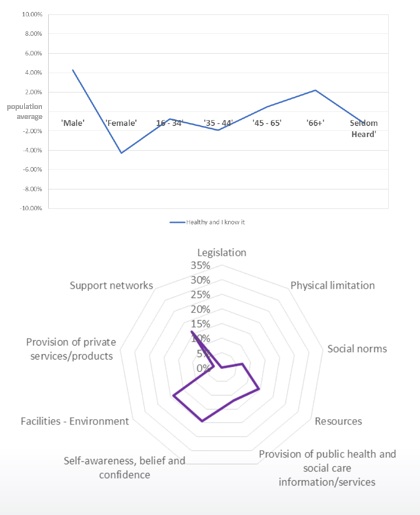13% of our people are “healthy and they know it”.
This population has more men and less women that the average, with slightly more older people (66+ years old) and just as many “seldom heard” people.

When discussing what hinders or helps people to take charge of their health? Their conversation reveals four priorities:
- Self-awareness, belief and confidence
- Facilities and the physical environment
- Support networks
- Personal resources – time and money
Interestingly, this was the only group who place real emphasis on support networks.
We can create a “typical narrative” from their ideas, comments and votes in the online workshop too.
I know I am healthy and I don’t need to do anything to improve my health but other people can’t take charge of their health because…
Self-awareness, belief and confidence
They are simply not aware of the fact that they are living unhealthy lives. There are also those who know they should adopt healthier behaviours, i.e. stop smoking, but lack the motivation to do so.
“[I am amazed] at the lack of understanding of how important exercise is for so many health issues – mental , physical and social health”
“Lots of people are walking around with high blood pressure, but unaware of it.”
Facilities – environment
Not only leisure facilities are inaccessible. On top of this, people use their cars instead of walking and cycling because our roads are always busy and full of aggressive drivers and our public transport system is expensive and fragmented.
“I can easily walk or cycle the distance to most things I need to get to, but often it’s not nice to do so with busy roads, cars parked on pavements, aggressive drivers, etc. We need to make big changes so it’s not the easiest option for people to jump in their cars.”
“The public transport system is so fragmented across Greater Manchester and expensive that it puts people off so they use their car. Cheaper, cleaner and more integrated public transport could help to reduce car use, reduce pollution”
“We would love to play more sports, but the facilities are not there.”
Support networks
There are not enough voluntary/community support groups and classes to help people to manage and improve their health.
“Create more community classes for all levels to help people manage their own health, especially for those with long term conditions.”
“We need a wide range of work with the voluntary sector supported and promoted to help people with all the issues they face not just ‘health’.”
Resources
People that I know feel constantly over-worked and overwhelmed. They lack time and money to live healthy lives.
“[I feel like] the hamster wheel is on turbo charge…[I need] More time at home to cook proper meals, enjoy local leisure facilities, spend quality time with family….the simple things really.”
“Sadly I think that the issue with not eating well is down to time management. Many people seem to believe that preparing food from scratch takes a long time, and they are not prepared to invest that time.”
Interestingly, solutions offered by this population include:
>Provide practical food education programs at school
>Promote using an app called Ubble which benchmarks your health against a big database of people like you
>Use local libraries as health hubs
> Consider wider determinants of health including access to suitable housing, good employment and education, clean air
>Link people with voluntary groups to do local pickup/drop off to enable people to access services or receive social support